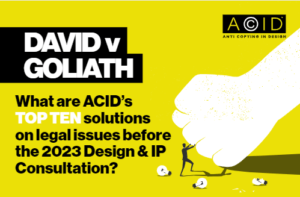 As one of the UK’s leading campaigning organisations for Designs and IP, Anti Copying in Design (ACID) has presented Government with potential solutions to address what the majority think are an outdated set of laws that are not fit for purpose. Simplifying the complexity of design law and enabling access to enforcement more cost and time effectively are high on the agenda. Strengthening design law with a tangible deterrent against copying, includes a strong recommendation of the introduction of criminal sanctions for the deliberate infringement of an unregistered design, in line with those who rely on copyright.
As one of the UK’s leading campaigning organisations for Designs and IP, Anti Copying in Design (ACID) has presented Government with potential solutions to address what the majority think are an outdated set of laws that are not fit for purpose. Simplifying the complexity of design law and enabling access to enforcement more cost and time effectively are high on the agenda. Strengthening design law with a tangible deterrent against copying, includes a strong recommendation of the introduction of criminal sanctions for the deliberate infringement of an unregistered design, in line with those who rely on copyright.
After all, why should a song writer, film maker have stronger IP rights than a furniture maker or lighting designer? It doesn’t make sense.
See ACIDs “Top Ten” here.
2022 presented a rare opportunity for designers and manufacturers to answer the question posed by Government (the Intellectual Property Office) about design law in a series of questionnaires and Call for Views. Continuing high level talks with the IPO have given ACID the opportunity to offer potential solutions prior to a Designs Consultation in 2023 when the framework for design and IP will be examined.
Dids Macdonald OBE., CEO of ACID said: “The continuing culture of “David & Goliath” copying must be addressed and promulgated because design (IP) law is too costly and complex to enable SMEs to enforce. The consequences of which are chilling for innovation, leading to business uncertainty and untold stress. Design law reform has been largely ignored for over two decades.
For a sector that punches well above its weight, contributing nearly £100 billion to the UK’s GVA and employing nearly two million in design and design skills, the precious asset that is our intellectual property underpinning this sector cannot continue to be ignored by policy makers. The 2023 Designs Consultation is a gold nugget for government to make positive changes.”
Generally, there was consensus from all respondents to the Calls for Views that:
• The registration system unreliable and complicated and costly if you get it wrong, e.g., Trunki.
• Enforcement is too costly and complicated (for bringing and defending an infringement action); insufficient awards of damages and costs (need to protect investment and costs)
• There is a need for a streamlined enforcement procedure
• Simplification of the law but not at the cost of protection
• Increase in term of rights for longer period of protection
• Product first disclosure – simultaneous disclosure (post Brexit, on what medium and what would be considered valid disclosure?)
• International harmonisation/alignment with EUIPO
• The Intellectual Property Enterprise Court (IPEC) should be expanded to cover registered and unregistered design cases as recommended by Hargreaves
• (Independent of UKIPO) a designs opinion service/examination prior to enforcement
• Introduction of user-friendly AI tools – reliable for searches (this could be helpful if developed for registered and unregistered designs in some way)
Anti Copying in Design (ACID) is a trade association for designers and manufacturers with a diverse membership ranging from individuals to multinationals and spanning many industry sectors. The organisation is committed to fighting design theft and lobbying Parliament for design law reform. Members have many free benefits including access to a specialist intellectual property legal hotline for initial free advice and, if relying on unregistered Community or UK design rights, have unlimited use of the ACID IP Databank to help protect their intellectual property (IP) Rights. ACID’s key objectives are protection, deterrence and education, working towards a safer commercial trading framework, enabling originators to fully exploit and maximise their IP rights.
